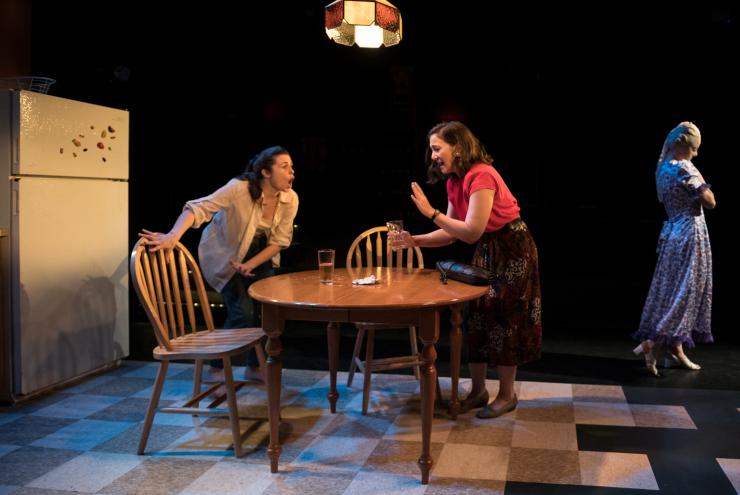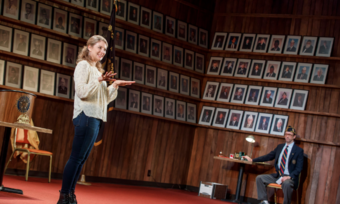Sheila Puts Women Center Stage
Sometimes the most powerful acts of rebellion are also the most quiet. This can be said of Sheila, the quietly compelling new play by The Associates that made its world premiere at A.R.T./New York Theatres.
The story of two childhood best friends who have reunited after a decade of estrangement, Sheila is, on the surface, a simple play. Staged on one set, with three actors and no costume changes, the play is about women, by women and for women—a deliberate act made in a male-dominated industry.
Following the 2015 production of Black Protagonist, the Associates’ play examining racial identity that featured its three female members in supporting roles, the ensemble was determined to craft a production about women. The result is Sheila, a haunting tale of connection and alienation that is both startling and reassuring.
The women are Mary and Gloria, childhood best friends nervously reuniting after a ten-year separation. Audiences can see this get-together is emotionally charged, although at first we do not know the reason why. Polite small talk is made as the two struggle to reconnect, revealing the extreme differences in their lifestyles. Mary, played by Peregrine Heard, is dressed in a casually and subtly stylish ensemble. She works as a nurse, lives in her childhood home and, after struggling to care for her ailing mother for two years, has recently placed her in a home for the aged, a decision that has taken a toll on the young woman. Gloria, on the other hand, doesn’t have a job, a bank account, or a formal lease for the furnished apartment she recently moved into. Played with a focused intensity by Lauren LaRocca, she appears uncertain and out of place in her own home.

But the differences between the two are far more than simply superficial. Mary and Gloria possess decidedly different goals and expectations from their lives, a fact starkly revealed in a conversation about motherhood in which Mary bluntly and unequivocally passes judgment on Gloria after learning of her choices. It’s only when they reminisce about their childhood—and their shared childhood creation of Sheila—that the warmth and connection between the two women is apparent.
Sheila, played by Emily Stout in a commanding, if speechless, performance, is the product of the two women’s imaginations—a being on which they projected their young and idealistic hopes and dreams. Throughout the 75-minute play, she stalks about the stage, her face hidden by a mask adorned with unsettlingly large eyes, walking silently through the rooms, jumping out of the fridge, and sitting close to Gloria and Mary as they talk.
The whole duration of the play, the tragedy of it is they don’t have the words…They don’t have the capability to look each other in the eye and talk about things in terms of patterns, the patriarchy, systemic oppression…
But even though they converse at length—about happiness and fulfillment, about motherhood and responsibility—the two women don’t say what they need to about the secret that haunts their past and brought about the separation ten years ago, an omission felt clearly thanks to Heard and LaRocca’s commanding performances.
“The whole duration of the play, the tragedy of it is they don’t have the words,” Heard said. “They don’t have the capability to look each other in the eye and talk about things in terms of patterns, the patriarchy, systemic oppression… Mary, living in the Midwest, going to nursing school is certainly not attending student meetings. Gloria is getting to dip into equality-based and more radical ideals. In terms of their relationship and the tools of communication, their whole relationship is built around the idea of Shelia, which is itself so intangible and seems almost pre-language.”
Despite clinging to the memory of Sheila, it is obvious this is not a friendship that can continue. The pain and resentment between the two women is too much to transcend. Gloria wants to “shed” her older self, while Mary has clung to memories of the two for the past decade. Mary’s shock at Gloria’s decisions—especially with regards to motherhood and Gloria’s resolve to maintain her lifestyle—illustrate this clearly. But Gloria’s calm assertion that she was not meant to be a mother—a statement so shocking to Mary that she had to leave the room—was, in this critic’s opinion, the most daring and courageous moment of the show.
Rather than a tearful outburst or shameful confession, Gloria says, “I do not believe that every woman, by virtue of the fact that she is a woman, can make a mother. I do not make a mother… I want you to understand me. There’s something going on with me that is not good for the people I love. I don’t know what to do about it. But I’m trying to spare them the dim, darkness that was settling over me. A child should not have to go through life looking up and seeing her mother in…despair.”
Sheila isn’t an ostentatiously rebellious play. There are no acts of violence, no protests, and no picket signs. But in its subtle, self-assured way, the production is rebelling.
“I love saying that line,” LaRocca said, reflecting on the moment. “I think that’s one of the lines I get to say that really feels like I’m able to or have the opportunity to channel something bigger than myself when I say, ‘… virtue of being a woman makes a mother.’ Gloria believes it from her core. But that’s one of those lines where I’m not really thinking about Gloria talking to Mary. I get to stand onstage right now and say this, and I’m very happy to do so.”
Sheila isn’t an ostentatiously rebellious play. There are no acts of violence, no protests, and no picket signs. But in its subtle, self-assured way, the production is rebelling. By putting women center stage—writing the roles Heard and LaRocca said they weren’t seeing at casting calls—it is rebelling. By bluntly and unapologetically presenting motherhood with its complexities and sorrows, as well as its joys, it is rebelling. And its narrative defies convention by refusing to give these two friends a happy ending.
The conclusion of a long-time friendship seems tragic to some and is often portrayed that way in entertainment, which frequently presents female relationships as either riddled with catfights, dangerously toxic, or superficial, with breakups that are both tragic and tear-filled. But at times, an ending is inevitable, and Gloria and Mary accept it quietly and say goodbye, while behind them, Sheila lays her head on the table, appearing exhausted and resigned. Just like their play, Gloria and Mary defy conventions—and they defy Sheila as well.









Comments
The article is just the start of the conversation—we want to know what you think about this subject, too! HowlRound is a space for knowledge-sharing, and we welcome spirited, thoughtful, and on-topic dialogue. Find our full comments policy here